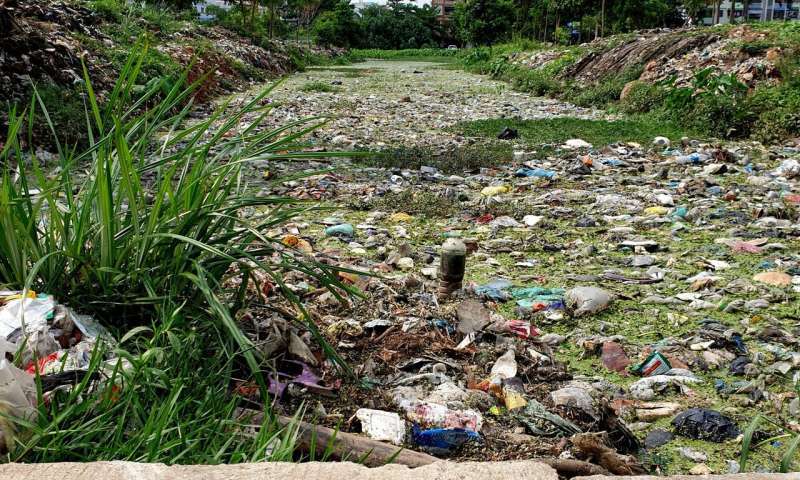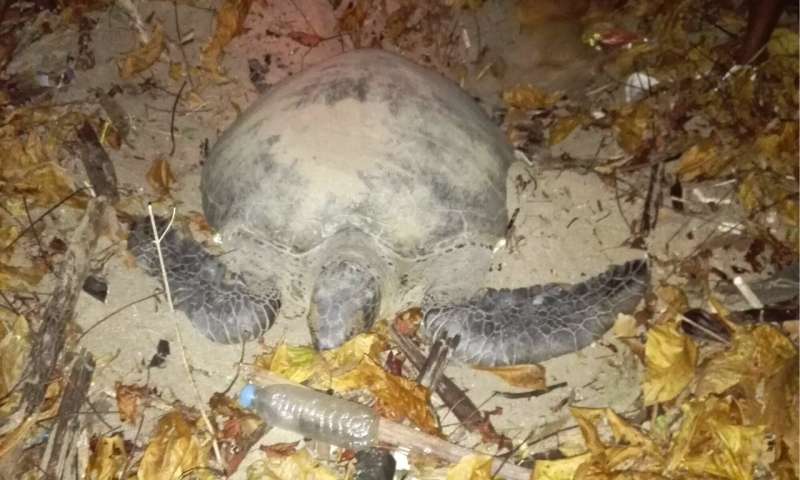Credit: Friedor Jeske/Thant Myanmar
A new survey has revealed yet another hurdle facing Myanmar's already-threatened turtle hatchlings: plastic. As if avoiding being harvested as eggs and enduring soaring nest temperatures were not enough, these helpless newborns must now clamber over washed-up plastic bottle caps, coffee sachets and food packaging on their hazardous journey down the beach to reach the relative safety of the sea.
The beaches in question are located at the delta of the Irrawaddy river, which, according to the recent survey conducted by Fauna & Flora International (FFI) and Thant Myanmar, transports a shocking 119 tons of plastic pollution every day.
The findings show that the upper Irrawaddy regions contribute 58 tons of plastic pollution per day, with the lower delta region and Yangon, Myanmar's capital, adding a further 32 tons and 29 tons respectively. The majority of plastic found in the river is likely to be mismanaged plastic waste. The most commonly encountered items were made from hard plastic, mainly comprising bottle caps. Soft plastics including food packaging, polystyrene foam and single-use sachets made up the rest.
The research also found that the amount of plastic pollution in the river is 17 times greater during the rainy season compared to the dry season. With the rains, accumulated plastic pollution caught in the river's banks is mobilised and washes downstream.
Marine habitats around Myanmar—especially in the Bay of Bengal—are also heavily polluted by microplastics. A study conducted by the Fridtjof Nansen research vessel recently found that concentrations can reach up to 28,000 particles per square kilometre. Such high microplastic pollution levels can pose an even greater threat to turtle hatchlings, who are known to eat microplastics if they swim through polluted waters.
This female turtle struggled to find a nesting spot on the beach due to the presence of plastic and other rubbish. After four hours, she finally managed to nest successfully. Credit: Ko Myint
A multifaceted issue
Myanmar's coasts are home to five species of marine turtle. In 1911, thousands of turtles nested in the country's delta region, but today, nesting females are confined to double figures. As in many former turtle strongholds around the world, the causes of decline for Myanmar's turtles include unregulated harvesting of eggs and bycatch by nearby fishing vessels. Rising temperatures also present a sinister threat to global turtle populations—eggs only hatch within a relatively narrow temperature window and a nest that is too hot can be fatal. Add to this the incoming threat of plastic pollution—both on nesting beaches and in the sea—and the challenge facing turtles seems truly immense. On land, larger plastic items can block hatchlings' journey to the shore and microplastics in the sand where turtles nest can affect turtle breeding by changing the conditions at nesting sites. In the ocean, plastic may be accidentally ingested as food, which is associated with increased likelihood of sea turtle mortality.
But plastic pollution is not just an environmental issue, it is a devastating global health problem, too. A recent report by FFI, Tearfund, Waste Aid and the Institute of Development Studies brought to light the impact that plastic pollution from mismanaged waste has on people: 400,000 to one million people in the developing world are dying every year as a result of mismanaged waste including plastic. Myanmar's rural areas face great risks—in the absence of any official waste collection systems, waste is often dumped directly into the river, destined to be washed into the ocean by the monsoon rains.
Looking forward
The survey findings, along with tools and options for addressing them, were recently discussed by experts and policymakers at a workshop in Nay Pyi Taw, Myanmar. Plastic taxation and bans, awareness raising, business incentives and a reduction in the use of plastic packaging were all debated, and the Environmental Conservation Department is now drafting a "Master Plan for Solid Waste Management."
U Zau Lunn, Marine and Freshwater Programme Manager at FFI, said, "We know the plastic pollution crisis is a global crisis but this is the first time we have quantified Myanmar's contribution to this crisis. We must work with policymakers to find solutions that tackle plastic pollution at its source so we can stop this pollution damaging our coastal ecosystems."
Our efforts to tackle plastic pollution from mismanaged waste in the Irrawaddy add to our ongoing turtle conservation work in Myanmar, working with partners and supported by the US Fish & Wildlife Service to conduct beach monitoring at key nesting sites and recording temperature data to track trends over time, alongside broader awareness raising and training activities. During the 2019-20 season, we will undertake more in-depth temperature data logging to obtain a greater understanding of the impacts on turtles and potential management measures to protect them.
Provided by Fauna & Flora International

























